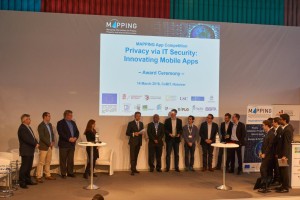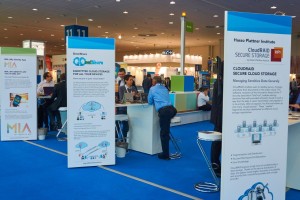The MAPPING project (www.mappingtheinternet.eu) successfully concluded the Privacy via IT Security App Competition (www.mapping-competition.uni-hannover.de) with its highly anticipated Award Ceremony at the CeBIT 2016 exhibition. The two-hour event included key-notes from distinguished guests on topics related to privacy as well as demonstrations of the three winning proposals and teams. These were followed by the eagerly awaited announcement of the competition’s overall winner. The final ranking is as follows:
1st place: OmniShare (https://ssg.aalto.fi/projects/omnishare)
How secure is your data in the cloud? To mitigate the risks of a cloud data breach or insider threat, various solutions encrypt data on-device before uploading it. But then how do you decrypt this data on a different device or share it with a friend? Deriving keys from the user’s password is insecure. OmniShare solves this problem by combining strong client-side encryption with secure yet intuitive key distribution mechanisms. Secure cloud storage just became usable!
Competitor: A collaboration between the Secure Systems Group at Aalto University and the System Security Lab at Technische Universität Darmstadt.
2nd place: MIA – My Identity App (http://www.staatsdruckerei.at/mia)
MIA is you in one app – all governmental ID information in one spot. MIA combines digital representations of classic “offline-documents” and electronic identities (eID) for transparent use in the physical and digital world. MIA focuses on building security into its processes rather than hardware like secure elements – thus providing the indispensable possibility for non-geek broad adoption for an accepted and used ID-system.
Competitor: Österreichische Staatsdruckerei (OeSD)
3rd place: CloudRAID for iOS (http://sec.hpi.de/cloudraid)
„CloudRAID for iOS” aims to be a trustworthy, transparently designed app for all iOS devices. It utilizes the large amount of affordable storage resources in clouds to store private or confidential data of end users. Therefore, the cryptographic keys always remain on the device. Hence, neither storage providers nor our meta data server is capable of reading any file contents. The meta data server’s role is synchronization across multiple devices or sharing with other users of the system.
The technical core is based on strong hybrid encryption, i.e. file contents are encrypted symmetrically and encryption keys are protected by asymmetric encryption. In addition, the distribution of the fragmented file across a hybrid cloud setup enhances all major data security aspects dramatically: confidentiality, availability, and integrity. Each cloud storage provider will only preserve part of the original file and the software can chose a subset of the fragments for reconstruction.
Competitor: The Hasso Plattner Institute (HPI) at the University of Potsdam
The team behind OmniShare will receive the 20 000 EUR prize for the further development and deployment of the App, and all three winners were given the opportunity to present their Apps and activities throughout the week at their own Start-up Workstations at CeBIT 2016.
The importance of the App development was underlined by the appearance of distinguished guests and renowned experts in the field of privacy. Participants of note included Joseph. A. Cannataci (UN Special Rapporteur on the Right to Privacy & MAPPING Coordinating Person), Christoph Grabenwarter (Judge at the Austrian Constitutional Court), Sachar Paulus (Faculty of Computer Science, Mannheim School of Applied Sciences) and Jan Philipp Albrecht (Member of the European Parliament). Full agenda of the event is available here.
Participants of the event had the opportunity to discuss privacy related issues with speakers, winning teams and the competition’s jury members at the closing Meet &Greet session.
The call for innovative Apps opened on December 1 2015, and lasted until December 31. It was spread across several hundreds of faculties of European universities, as well as being publicly announced on the competition website. The competition generated significant interest from applicants, with an impressive number of high quality proposals submitted.
Contacts:
Competition coordinator: Institute for Legal Informatics, Leibniz University Hanover (DE), mapping@iri.uni-hannover.de
Project coordinator: University of Groningen (NL), projectoffice@mappingtheinternet.eu
Dissemination coordinator: EPMA (CZ), info@mappingtheinternet.eu


